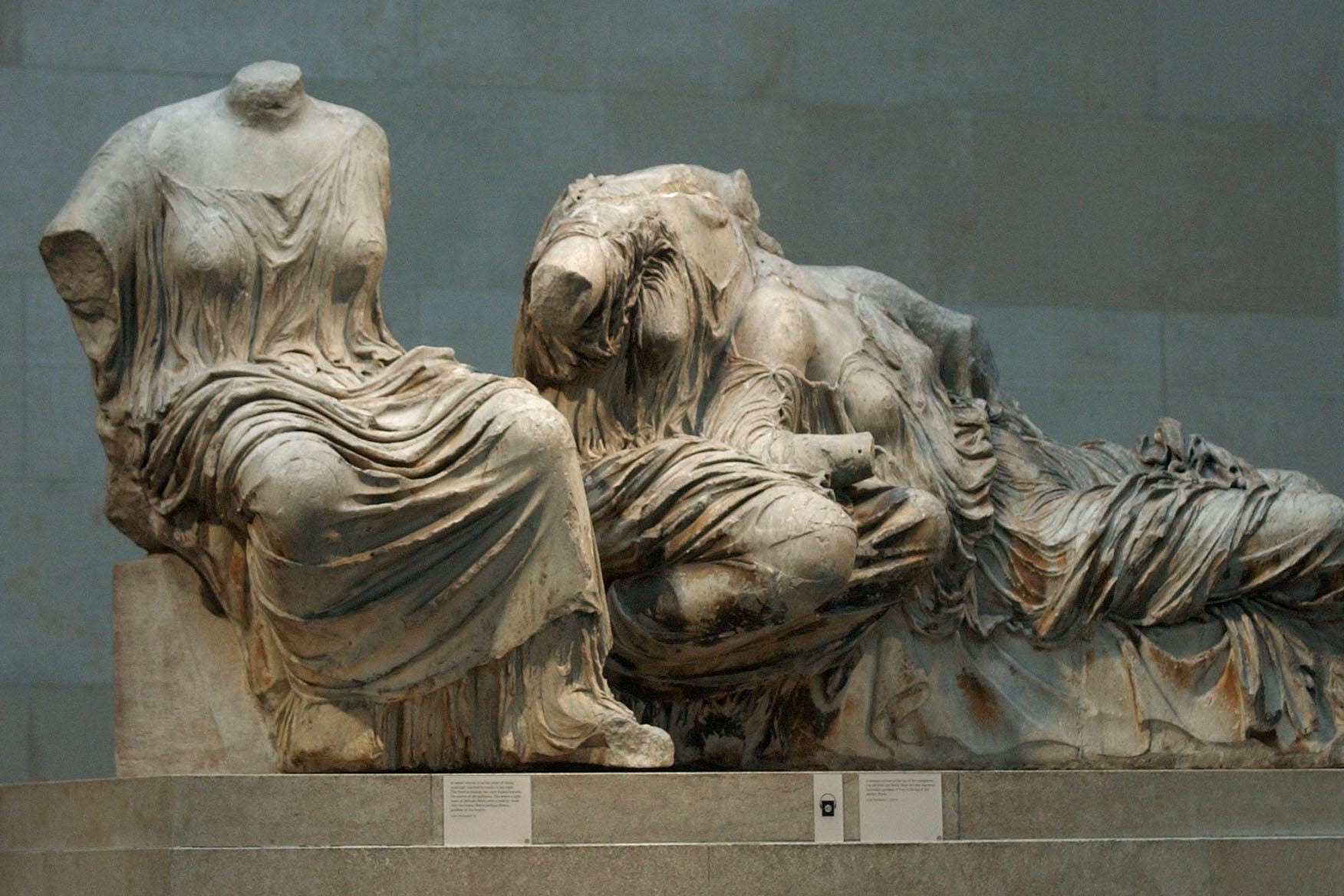Everything you need to know about the controversial Elgin Marbles
Rishi Sunak caught up in diplomatic row with Greece over the potential return of the artefacts

Rishi Sunak has found himself embroiled in a fresh diplomatic spat over the Elgin Marbles after cancelling a meeting with his Greek counterpart, Kyriakos Mitsotakis, at the last minute after it became apparent he planned to raise the question of their return.
During an interview with the BBC, Mr Mitsotakis compared the marbles – also known as the Parthenon Sculptures and stored at the British Museum since the early 19th century – to Leonardo Da Vinci’s Mona Lisa, saying Britain retaining them was akin to carving the famous Renaissance portrait in half and keeping part of it in London and the other in the Louvre.
Downing Street duly cancelled the meeting, at which illegal migrant sea crossings had also been on the agenda, and offered Mr Mitsotakis a sitdown with deputy prime minister Oliver Dowden instead, which he refused.
A spokesperson for the Greek delegation said they were left “baffled, surprised and not a little bit annoyed” by the 11th hour cancellation while the opposition Labour Party was quick to claim the incident demonstrated that Mr Sunak “isn’t able to provide the serious economic leadership our country requires”.
A spokesperson for No 10 rejected Mr Mitsotakis’s Mona Lisa analogy and said of the relics: “These were legally acquired at the time, they’re legally owned by the trustees of the museum. We support that position and there’s no plan to change the law which governs it.”
Here is everything you need to know about the Parthenon Sculptures.
1) What are the Elgin Marbles?
The sculptures are remnants of a 160m-long frieze that ran around the outer walls of the Parthenon temple on the Acropolis, dedicated to Athena, goddess of wisdom.
The Parthenon was built between 447 and 432 BC and is considered the crowning work of classical architecture.
Much was lost in a 17th century bombardment and about half of the remaining works were removed in the early 19th century by British diplomat Lord Elgin, who gave them to the British Museum.
2) Why is there a controversy?
The sculptures’ presence in Britain has been the subject of ongoing controversy and debate for decades.
Greece maintains they were taken illegally during the country’s Turkish occupation and should be returned for display in Athens, which the British Museum and the UK government have previously rejected.
In December 2022, Pope Francis decided to send back to Greece the three fragments of Parthenon Sculptures that the Vatican museums have held for centuries, leaving the British Museum among those declining to do so.
Responding to the pontiff’s gesture in January this year, a British Museum spokesman said: “We’ve said publicly we’re actively seeking a new Parthenon partnership with our friends in Greece and, as we enter a new year, constructive discussions are ongoing.”
3) Where are they currently housed?
Of the 50 per cent of the original sculptures that survive, around half are in the British Museum and half in Athens, according to the British Museum.
The 17 sculptures have been in the British Museum since 1816, apart from spending the Second World War years safely shielded from the Blitz below ground in a Tube station.
The one exception is a sculpture of the river god Ilissos, which was temporarily loaned to St Petersburg State Hermitage Museum in Russia.
Neil MacGregor, former director of the British Museum, stepped down following controversy after he backed the the move to loan a section of the display to Russia.
In 2009, the Acropolis Museum was built to house the sculptures that remain in Greece alongside other treasures.
4) What has the Greek government previously said?
A formal request for the permanent return of all of the Parthenon Sculptures in the Museum’s collection to Greece was first made in 1983 and discussions have been ongoing since, according to the British Museum’s website.
Mr Mitsotakis has on many occasions called for the marbles to be returned, even offering to lend some of his country’s other treasures to the British Museum in exchange.
In recent years, a team of London lawyers including Amal Clooney, best known as the wife of Hollywood film star George Clooney, were involved in talks with the Greek government about a potential legal bid for the works.
Successive Greek administrations have “refused to acknowledge” the Trustees’ title to the Parthenon Sculptures, the British Museum said.
5) What have the British government said about the Elgin Marbles?
Ministers have long resisted calls for the classical sculptures to be returned to Greece.
The British government rejected Tory peer Lord Vaizey of Didcot’s call for a change in the law to make it easier for UK museums to deal with restitution requests.
Current legislation prevents treasures from being legally given away by the museum.
Former prime minister Liz Truss ruled out supporting a deal to return the Elgin Marbles to Greece, despite George Osborne, chairman of the British Museum and former Tory chancellor, saying there is a “deal to be done” to share the Parthenon Marbles with Greece.
Bookmark popover
Removed from bookmarks